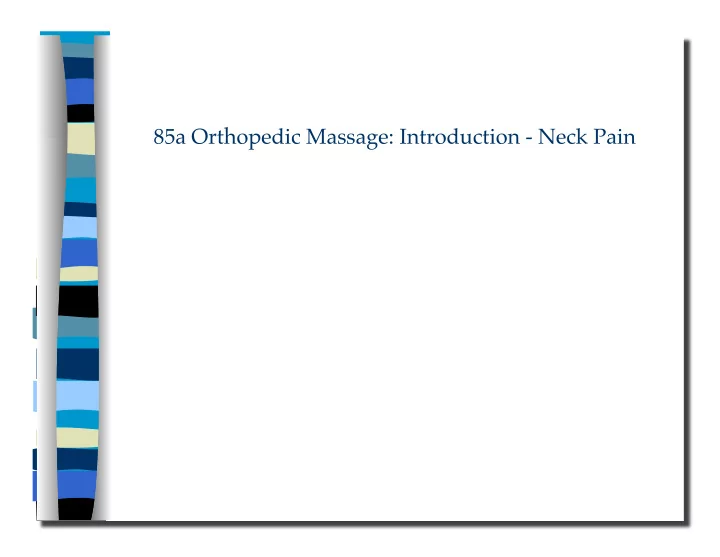

85a Orthopedic Massage: Introduction - Neck Pain
85a Orthopedic Massage: Introduction - Neck Pain � Class Outline 5 minutes Attendance, Breath of Arrival, and Reminders 10 minutes Lecture: 25 minutes Lecture: 15 minutes Active study skills: 60 minutes Total
85a Orthopedic Massage: Introduction - Neck Pain � Class Outline Assignments: � • 85a Orthopedic Massage: Outside Massages (2 due at the start of class) NOW!!! Written Exam: � • 89a Practice MBLEx (100 questions in 120 minutes) Quizzes: � • 87a Kinesiology Quiz (semispinalis, splenius capitis, and splenius cervicis) • 90a Kinesiology Quiz (erectors, multifidi, rotatores, quadratus lumborum, levator scapula, trapezius, splenius capitis, splenius cervicis, and semispinalis capitis) Spot Checks: � • 87b Orthopedic Massage: Touch Assessment • Bring your grading sheet for evaluation A: 87 Preparation for upcoming classes: 86a MBLEx Prep � • Using ABMP Exam Coach, select “Study Subjects”, and then “Special Populations” • For each of the 7 Massage Theory Topics, “Take a Practice Quiz” 4 times (28 total) • Research anything that isn’t clear on the Internet and bring what you find to class 86b Orthopedic Massage: Technique Review and Practice - Neck Pain �
Classroom Rules Punctuality - everybody’s time is precious Be ready to learn at the start of class; we’ll have you out of here on time � Tardiness: arriving late, returning late after breaks, leaving during class, leaving � early The following are not allowed: Bare feet � Side talking � Lying down � Inappropriate clothing � Food or drink except water � Phones that are visible in the classroom, bathrooms, or internship � You will receive one verbal warning, then you’ll have to leave the room.
Transversospinalis Group � Trail Guide, Page 200 Transversospinalis group: • Multifidi • Rotatores • Semispinalis capitis These 3 muscles are deep to the erectors. New to us, the semispinalis capitis muscle can be seen as the “twin speed bumps” on the posterior neck. Posterior View
A O I Posterolateral View
A O I Posterior View
A O I Posterior View Posterior View
A O I Posterior View
A O I Posterior View
A O I Posterior View
A C1/Axis C2/Atlas C3 C4 O C5 C6 C7 T1 T2 I T3 T4 Posterior View
A O I Posterior View
A O I Posterior View
A O I Posterior View
A O I Posterior View
A O I Posterior View
A O I Posterior View
85a Orthopedic Massage: Introduction - Neck Pain � Packet J - 109
Neuromuscular neck pain Neuromuscular neck pain Hypertonicity either throughout an entire neck muscle or in localized areas of a neck muscle. Anterior View
Etiology Keeping the head in an upright position places postural strain on cervical • muscles and other soft-tissues. Once the head moves forward of the center of gravity, there is a significant • increase in muscle activity to hold the head upright. This can lead to muscular dysfunction in the form of trigger points or hyper- • tonicity in an entire muscle.
Etiology A pain-spasm-pain cycle can result from even slight muscular dysfunction. • Sudden loading of hypertonic cervical muscles can produce symptoms in • other areas such as the temporomandibular joint.
Etiology Because many cervical muscles maintain constant isometric contractions during • the day just to keep the head erect, patterns of dysfunction are facilitated by the very act of attempting to hold the head upright. These patterns of dysfunction can have a tendency to recur any time the • individual is exposed to physical, psychological, or chemical stressors.
Traditional Treatments Immobilization using a cervical collar Variable effectiveness: only used if the pain is severe and joint hyper- • mobility is a serious concern. Rest • Variable effectiveness: continue normal daily functions, but avoid any painful activities.
Traditional Treatments Instruction in body mechanics, stretching, and strength training Effective: if done properly and regularly • Anti-inflammatory medications Variable effectiveness: reduces pain if there is inflammation •
Considerations and Cautions � for Neuromuscular Neck Pain Neuromuscular pain is established by constant reinforcement. Early in your • treatment, encourage the client to change these movement patterns to complement the myofascial manipulation.
Considerations and Cautions � for Neuromuscular Neck Pain Stretching and flexibility enhancement are essential to treating • neuromuscular pain. Stretching is most effective after soft-tissue manipulation has enhanced tissue pliability.
Considerations and Cautions � for Neuromuscular Neck Pain This treatment can dramatically alter muscular proprioception resulting in • spasms in an easily overloaded muscle. Have the client move slowly and carefully when first getting up from the massage table and for a short time afterward.
Considerations and Cautions � for Neuromuscular Neck Pain Clients with sensitivity during head and neck movement may brace with • protective muscle guarding. Be aware of these guarding possibilities, and make sure that your treatment encourages relaxation.
85a Orthopedic Massage: Introduction - Neck Pain
Recommend
More recommend